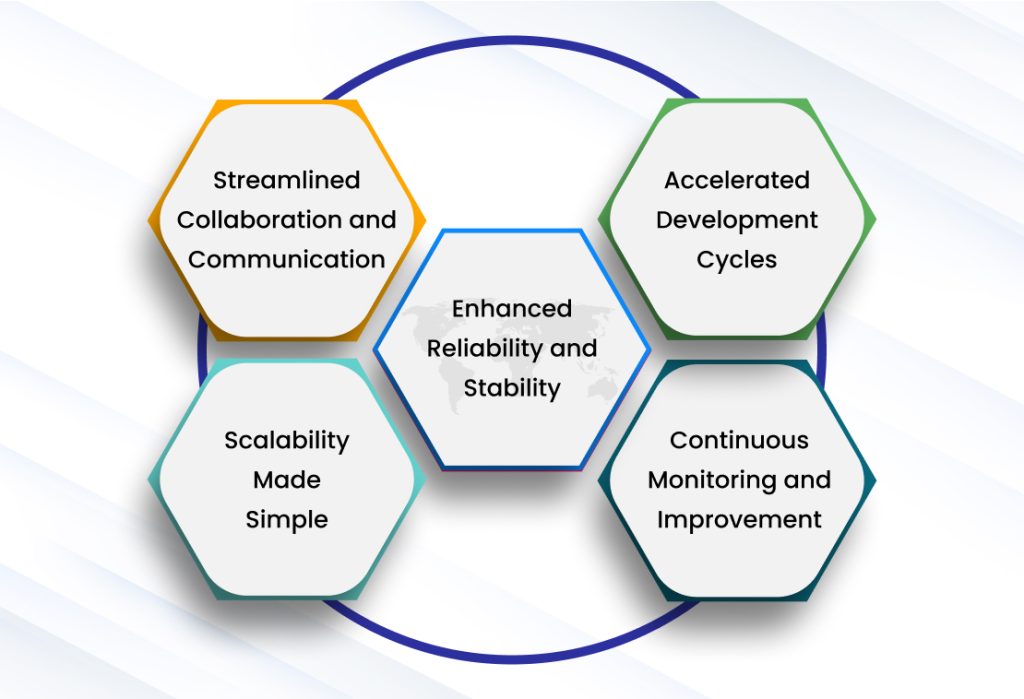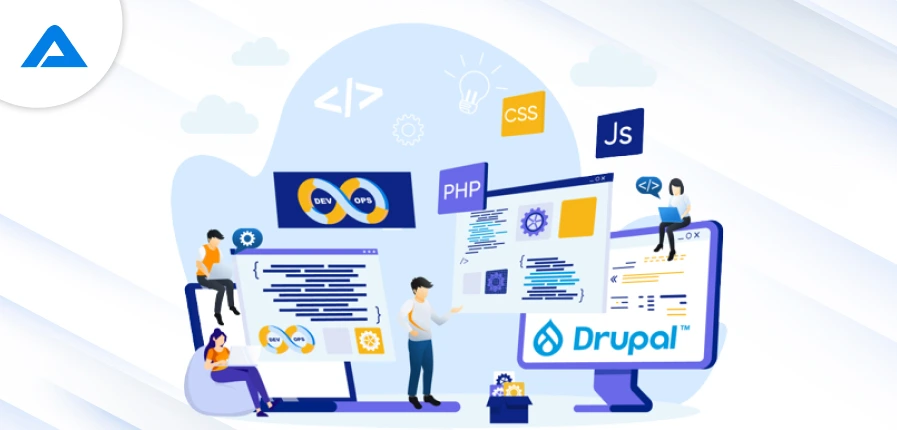DevOps, a portmanteau of “development” and “operations,” is a holistic approach to software development that emphasizes collaboration, communication, and automation between development and IT operations teams. It aims to streamline the entire software development lifecycle, from initial coding and testing to deployment and ongoing maintenance.
In Drupal development, DevOps ensures the seamless creation, deployment, and management of websites and applications. By breaking down silos between different teams and fostering a culture of cooperation, DevOps accelerates development cycles, enhances product quality, and delivers consistent and reliable outcomes.
The Evolution Journey of DevOps From Tools to Transformation
The evolution of DevOps has profoundly reshaped the landscape of web development, uniting once-disparate realms and redefining project success. In the early stages, traditional silos between development and operations led to inefficiencies and miscommunication. It emerged as the solution, emphasizing collaboration, shared responsibilities, and automation.
In web development, DevOps’s impact has been transformative. Continuous integration and automated testing have accelerated code integration, enhancing quality and minimizing risks. Automated deployment processes and “infrastructure as code” principles have expedited reliable releases, which is crucial in the fast-paced web environment.
DevOps consulting services have become integral, providing tailored strategies and implementation support. These experts customize DevOps practices for each project, recommending tools, workflows, and ongoing optimizations. With DevOps consultants, businesses navigate complexities, ensuring seamless collaboration, faster deliveries, and top-notch web applications.
It remains a cornerstone as technology evolves, delivering scalable, secure, and user-centric web solutions. The evolution continues, reshaping web development’s future, driven by the transformative power of DevOps and expert consulting services.
How does DevOps work?
DevOps, a revolutionary approach to software development, represents a harmonious fusion of development and operations. It’s a dynamic methodology designed to enhance collaboration, streamline workflows, and deliver high-quality software remarkably efficiently. Here’s a closer look at how it works and why engaging a DevOps consultant is pivotal for successful implementation.
1. Collaborative Culture: DevOps fosters a culture of collaboration between traditionally distinct development and operations teams. Open communication, shared responsibilities, and cross-functional skills promote synergy, breaking down silos.
2. Automation Advancements: Automation lies at the heart of DevOps. Manual and repetitive tasks are automated, from code integration and testing to deployment and monitoring, eliminating human errors, accelerating processes, and ensuring consistent outcomes.
3. Continuous Integration (CI): Continuous Integration (CI) entails the regular act of combining code updates into a shared repository. Automated tests are run to detect issues early, maintaining code quality and allowing rapid integration.
4. Continuous Deployment (CD): CD takes CI further by automatically deploying code changes to production or staging environments after successful testing, reduces manual intervention and enables swift, reliable releases.
5. Infrastructure as Code (IaC): IaC treats infrastructure setup as code, allowing it to be versioned, tested, and deployed like software, ensuring consistent and reproducible environments.
6. Continuous Monitoring and Feedback: It emphasizes continuously monitoring applications and infrastructure, providing insights into performance and user experience. Feedback loops facilitate prompt issue detection and resolution.
7. DevOps Consultant’s Role: Engaging a DevOps consultant is instrumental in navigating the complexities of its adoption. These experts assess existing processes, recommend suitable tools, and develop a tailored strategy. They guide organizations through cultural shifts, implement automation, and ensure a seamless transition.
Unlocking the Benefits of DevOps in Web Development

Embracing DevOps in web development brings many transformative advantages that elevate project outcomes and propel businesses in the digital landscape. From swift velocity to fortified security, its benefits resonate across every development phase. Engaging a proficient DevOps consulting company augments these benefits, ensuring seamless integration and optimal implementation within comprehensive Web Development Services.
1. Streamlined Collaboration and Communication
DevOps eliminates the customary boundaries that once separated development and operations teams. By fostering a culture of collaboration and open communication, it enables developers, QA testers, and operations professionals to work hand-in-hand throughout the entire development lifecycle. The result? Swift identification and resolution of issues, reduced development cycles, and a seamless flow of updates from code to deployment.
2. Accelerated Development Cycles
Time is of the essence in web development. Its practices, such as continuous integration and delivery (CI/CD), propel development cycles to new heights. Automated testing, frequent code integration, and automated deployment processes ensure that changes are swiftly and reliably incorporated into the final product. This not only speeds up the development timeline but also enhances the overall quality of the web application.
3. Enhanced Reliability and Stability
Web applications must perform flawlessly, regardless of user load or unforeseen circumstances. It emphasizes automation, ensuring that deployments are consistent and predictable. This minimizes the chances of errors caused by manual interventions and reduces system downtime. As a result, users experience higher levels of reliability, and your development team can focus on innovation rather than firefighting.
4. Scalability Made Simple
Going viral is the dream of every web application, but it can quickly become a nightmare if the infrastructure isn’t prepared to handle the surge in traffic. Devops enables automated scaling of resources based on demand, ensuring that your web app can gracefully handle sudden user spikes without compromising performance or user experience.
5. Continuous Monitoring and Improvement
The journey doesn’t end with deployment. DevOps encourages a constant loop of monitoring, feedback, and improvement. Real-time monitoring tools provide insights into application performance, user behavior, and potential bottlenecks. This data-driven approach allows your development team to proactively address issues, optimize performance, and deliver an exceptional user experience.
While adopting DevOps principles can transform your web development process, having a dedicated expert on your team takes it to another level. A DevOps expert brings specialized knowledge and experience, ensuring your practices are tailored to your needs. From setting up automated pipelines to optimizing server configurations, an expert ensures that your development and operations efforts align seamlessly.
Embracing DevOps methodologies in web development is not just a trend but a necessity. The benefits of streamlined collaboration, accelerated development cycles, enhanced reliability, scalability, and continuous improvement are undeniable. And when you’re ready to unlock the full potential, remember that the Hire DevOps Expert keyword might be your ticket to achieving a truly agile, efficient, and innovative web development process.

Experience uninterrupted business growth by incorporating DevOps into your software development cycle.

Pooja Upadhyay
Director Of People Operations & Client Relations
Best Practices Transforming Web Development with DevOps Solutions
Adopting the DevOps model has become a cornerstone in modern web development, ushering in a new era of efficiency, collaboration, and innovation. By embracing essential best practices, businesses can harness the full potential of it, seamlessly integrating it with their operations and paving the way for success. Engaging proficient devops solutions and partnering with a reputable Web Development Company enhances these practices for optimal results.
1. Performing Small Updates Frequently
DevOps thrives on incremental changes. Frequent, more minor updates ensure quicker turnaround times and reduce the risk of significant disruptions. This iterative approach maintains a steady cadence of improvements, enhancing user experience and enabling swift issue resolution.
2. Using Microservices Architecture
Microservices architecture modularized applications into smaller, independent components. This approach enables easier maintenance, scalability, and agility, making updates and deployments smoother and more efficient.
3. Leveraging Continuous Integration and Continuous Delivery (CI/CD)
CI/CD pipelines automate code changes’ integration, testing, and deployment, accelerate the development process, maintain code quality, and guarantee reliable, consistent releases.
4. Making Use of Infrastructure as Code (IaC)
IaC treats infrastructure provisioning as code, allowing for consistent and repeatable setups. This practice simplifies deployment, eliminates configuration drift, and enhances the overall reliability of the environment.
5. Monitoring and Logging the Workflow
Effective monitoring and logging provide valuable insights into the performance and health of applications. This proactive approach ensures early issue detection, rapid troubleshooting, and continuous improvement.
Engaging specialized devops solutions providers further amplifies these best practices. These experts customize DevOps strategies, integrate them seamlessly with web development processes, and provide invaluable guidance. Partnering with a reputable Web Development Company ensures a holistic approach where its practices align harmoniously with the intricacies of web development.
The best practices for its adoption hold the key to transformative web development. Businesses can optimize their development processes by integrating minor updates, embracing microservices, leveraging CI/CD pipelines, utilizing IaC, and implementing robust monitoring.
When coupled with expert devops solutions and collaboration with a reputable Web Development Company, these practices empower organizations to harness the full power, delivering innovative, high-quality web solutions that thrive in today’s dynamic digital landscape.

Implementing the DevOps Model with Expert DevOps Services Company
Collaborating with a proficient DevOps services company can be a game-changer when implementing the it model in Drupal development. This strategic partnership seamlessly infuses DevOps principles into the development process, yielding many benefits. The model emphasizes continuous integration, swift deployment, and automated testing optimizes efficiency and quality. Integrating Infrastructure as Code (IaC) and robust security measures also ensures scalability and protection against vulnerabilities.
A DevOps services company brings specialized knowledge to the table, aligning the best practices with the nuances of Drupal development. Their guidance ensures a smooth transition, and their expertise minimizes potential challenges. The outcome is a web development process that is agile and efficient, and tailored to Drupal’s unique requirements. By leveraging its model alongside the support of a dedicated DevOps services company, businesses can enhance their Drupal projects, delivering exceptional web solutions with confidence and precision.
The Evolving Future of DevOps
The future of DevOps promises a dynamic evolution, where innovative trends and technologies continue to reshape how software development and operations converge. It paves the way for groundbreaking transformations as businesses strive for efficiency, security, and scalability. Amid this evolution, integrating security, known as DevSecOps, is set to witness perpetual growth. It will become an intrinsic part of its culture, ensuring robust protection across the development lifecycle.
The synergy of DevOps and the Internet of Things (IoT) is another remarkable horizon. As IoT devices proliferate, its practices will be crucial in ensuring seamless connectivity, efficient updates, and optimized performance. Moreover, monitoring is poised to overshadow traditional testing methodologies. Real-time monitoring will become paramount, enabling rapid issue identification and rectification, enhancing user experience and application reliability.
Kubernetes, the orchestrator of containerized applications, is positioned to emerge as the standard for cluster computing. Its versatility, scalability, and automation capabilities make it an ideal choice for managing complex infrastructures efficiently. Furthermore, the future might witness the gradual removal of traditional server operating systems. With the rise of serverless computing and containerization, the role of conventional operating systems could shift significantly.
As these transformations unfold, the role of web developers becomes pivotal. Businesses must hire web developers, IoT integration, and emerging technologies expertise to navigate this evolving landscape successfully. These developers will orchestrate seamless workflows, optimize performance, and leverage innovative tools to ensure applications thrive in the ever-changing digital ecosystem.
The future of it is characterized by perpetual growth, IoT integration, real-time monitoring, Kubernetes adoption, and potential shifts in operating systems. As the technology landscape evolves, businesses must recognize the pivotal role of proficient web developers to harness these trends effectively, driving innovation and excellence in their digital endeavors.
Conclusion
DevOps has revolutionized software development, harmonizing agility and reliability. It empowers teams with high velocity, scalability, and security, fostering a collaborative ecosystem. This dynamic synergy, driven by continuous integration and delivery, showcases the intricate dance of microservices architecture and Infrastructure as Code, orchestrated by vigilant monitoring.
Its magic extends to Drupal development, where its principles amplify agility, reliability, and security, paving the path for remarkable digital experiences. The future unfurls with DevSecOps’ growth, IoT integration, and transformative shifts, like monitoring replacing testing and Kubernetes reigning in cluster computing. As we anticipate these changes, one constant remains the pivotal role of skilled individuals and web development companies. They will shape and navigate its evolution, crafting a future where innovation thrives in seamless harmony with reliability.

Do you want to hire a DevOps service company for your organization?

Pooja Upadhyay
Director Of People Operations & Client Relations


